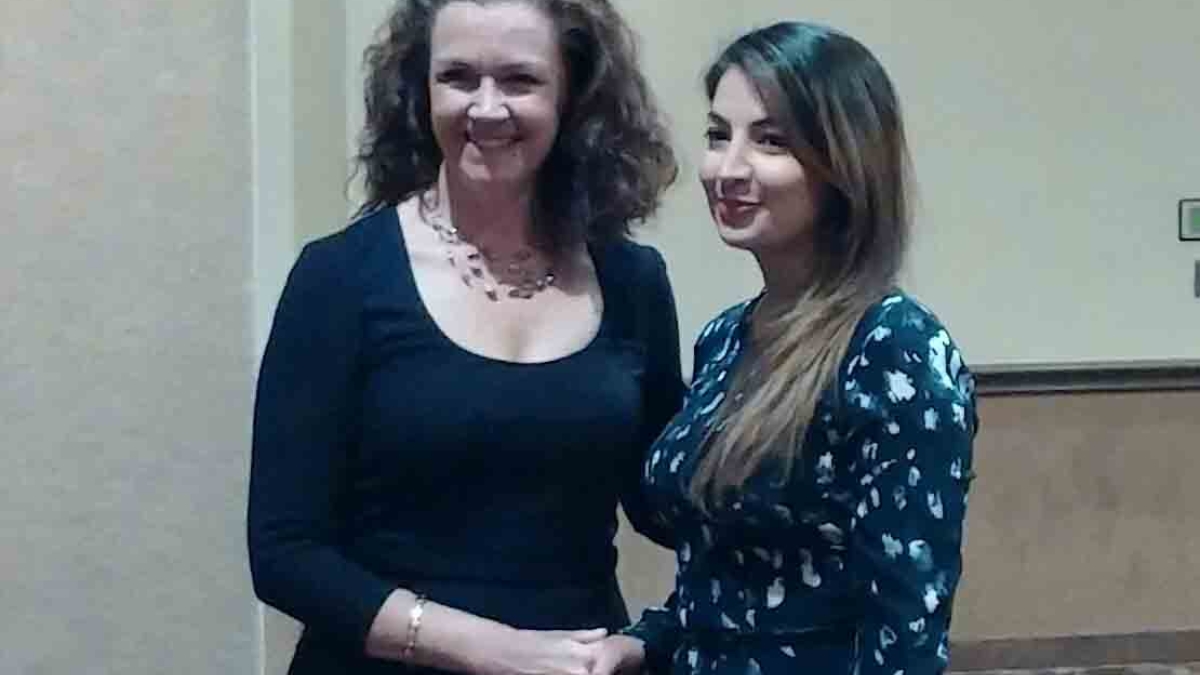ASU student wins award for paper honoring heritage

Mahalia Newmark (right) is congratulated by Karen Jarratt-Snider at the Western Social Sciences Association Conference. Newmark won the Vine Deloria Jr. Student Paper Competition Award for her work, "Reclaiming Dene Womanhood in Our Stories."
Mahalia Newmark says the strong women in her life inspired a paper that won the Vine Deloria Jr. Student Paper Competition at the Western Social Sciences Association Conference in April.
Newmark, who is pursuing a master’s in public administration, is a citizen of the Tulita Dene First Nations in the Northwest Territories, Canada. Her paper, "Reclaiming Dene Womanhood in Our Stories," explores the ways in which Dene womanhood can be reclaimed, as an act of decolonization, by remembering our stories.
The research started a year ago, when she began looking at leadership roles that Dene women take on. Newmark found there was a lack of Dene women in politics and governance. In an effort to understand why Dene women were missing in these arenas, she began to see how the lives of Dene women, and the traditional concept of Dene womanhood, had been negatively impacted by Canadian colonization. As a result, the stories of Dene women have been diminished and silenced.
Traditional Dene women were leaders in their communities; by reclaiming the stories of Dene women, Newmark seeks to reclaim Dene women’s capacity for leadership. So, she turned to family, and the story of her great-grandmother kept coming up.
“My small granny, Harriet Gladue, was very loving and kind. She was also a midwife for 50 years, taking the dog team into the bush to help women give birth,” she said. “Even when the town built a health-care center, people would still come to her to have their children delivered.”
She says that women were also empowered in their relationships. Her great-grandfather, Chief Albert Wright, considered the first chief of the community, had gone to residential/boarding school and knew English. He helped the community understand proposed treaties. Ultimately after his death, Newmark’s small granny would sign the treaty on his behalf.
“By remembering the stories of Dene women and Dene people through our own distinct Indigenous point of view, we remember the inherent strength and ability we have to be a leader,” Newmark said. “These stories are critical for women like myself and our youth.”
“I feel really inspired to share these stories because it shows the strength of Dene people and the heritage that I come from. We Native people have a lot to offer in terms of our own history, and knowledge systems.”
Newmark, who will be graduating soon, plans to pursue a career in Indigenous education. Her goal is to write more on the subject and possibly pursue a doctoral degree.
“Our successes are never alone. I never thought I would get a master’s degree; it was always kind of a dream. Now I realize that I need to dream bigger,” she said.
In the meantime, she has been accepted in the competitive Hatfield Resident Fellowship program at Portland State University, working with the Higher Education Coordinating Commission. She says the agency’s focus on outreach to American Indian communities in Oregon is appealing.
More University news

3 ASU students earn Goldwater Scholarships for STEM research excellence
Three Arizona State University students have been named Goldwater Scholars for 2025, placing them among the nation’s most…

Provost Teaching Awardees, Charter Professors empower local communities, students
The ASU Charter embodies the university’s commitment to student success and research of public value and responsibility to…

New online Bachelor of Social Work program exceeding enrollment expectations
Social workers are in big demand.Citing U.S. Bureau of Labor Statistics figures, the National Association of Social Workers…

